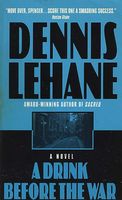I was somewhat ambivalent about going used book shopping. My on-deck shelf is near its limit as it is (it's the top of a dresser in my closet, running along the back edge and I don't like it to get much closer than two-thirds or so of that length; currently it is almost nine-tenths, so I have some reading to do). I also didn't want to distract too much from the sun and sand and sights of the Maritimes. I also didn't have time to plan much ahead of time, so felt not properly prepared for attacking ill-organized used bookstores.
But of course, once on site, my excitement got the better of me and I ended up with so many books that I had to get a separate box to put them in as my suitcase got to heavy to lug up to motel rooms. Here is the painful result:
My poor on-deck shelf is going to feel like Mr. Creosote soon!
Also due to my lack of preparation, I did very little photographing of the various bookstores we visited. It's a shame, because there were a couple of pretty interesting little spots. My wife noticed one just off the main road in Alberton, PEI. The place, a beat up old residence that had seen better days, was closed, but the guy had left his phone number in the window. I called but nobody answered. Happily, the next day he was there, parked in his truck outside the store, reading something. This place was paperback heaven. Unfortunately, he was clearly near retirement and the books were suffering from too long not being dusted. The place was for sale.
Another amazing find (also spotted by my wife, though this one was in the little Maritimes Used Book flyer that various stores had available in various years) was Amy's in Amherst, Nova Scotia. This was a bright white, vinyl-sided, windowless rectangle on the main business route (that goes by all the gas stations and Tim Horton's). Inside it was literally stacked floor to ceiling with books. They were quite clean and organized, though by author with many large piles that had yet to be organized. Here I found some serious gems, including The Green Eagle Score in paperback for $3. The owner was quite friendly and helpful, though edging very close to bitterness in the tough time he was having.
I would have thought that one of the prerequisites for running a used book store would be a kind of mania for organization and categorizing. This does not seem to be the case. Rather, it seems to be the contrary. Perhaps the job starts to overwhelm one's ability to organize. We encountered several establishments with pleasant, engaged proprietors who seemed completely and happily oblivious to the insane mess their store was in. My wife and I were both tempted just to quite our lives and sign on as intern to help put these guys' stores in order.
Overall, my haul was not mindblowing. I found a lot of interesting little books and some with just cool covers. The two big scores were the Parker mentioned above and one you will see below. Here are some of the more interesting finds:
For some reason, I also picked up a bunch of mafia crime books, the first two just because the covers looked so cool, but the third one I found (actually the first one in the photo) was the real major score.
I got all excited and nervous that the book seller would realize that he had a gem on his hands and charge me more than the $3 asking for Peter Rabe's War of the Dons. The cover is stained, but it is otherwise in pretty good condition and I believe a first edition (same edition, I believe, as Louis XIV's, but I suspect he didn't pay $3 for his! ;)). I note how the cover design, especially for the two Fawcett books, is very similar to Vendetta, which I quite enjoyed. I guess that was following up on the success of the Godfather?
Here are three other crime paperbacks I found, also dealing with the mafia, though these I picked up mainly because of their great covers:
I did actually buy a few hardcovers as well, though really nothing too exciting.
Both the Margaret Millar and the Gilbert are lowly book club editions, but they are nice looking and I thought would complement the other books on my not-so-full hardback shelf. The Deliverance does appear to be a first edition, a bit battered, but quite cool-looking.
The other bonus with the Margaret Millar book is that it has a picture of her on the back. Does she ever look Canadian!
I really don't know how I am going to handle my on-deck shelf, now that it will almost double in length and go far off the edge of my dresser. I am definitely going to have to get some reading done in the next couple of months, that's for sure!


















